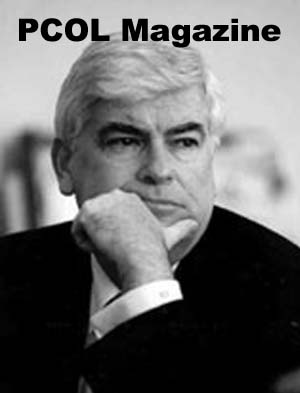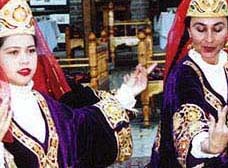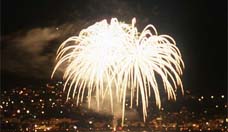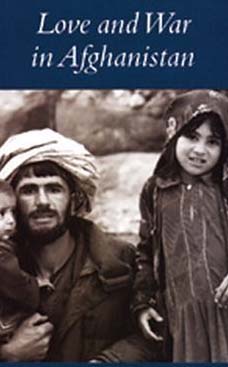
Sen. Chris Dodd on Fox News Sunday talks about Bolton nomination
Transcript: Sen. Chris Dodd on 'FNS'
Sunday, May 29, 2005
The following is a transcribed excerpt of 'FOX News Sunday,' May 29, 2005.
CHRIS WALLACE, FOX NEWS: Just 70 hours after senators cut a deal on judges this week, Democrats tied the Senate in knots over the nomination of John Bolton to be U.N. ambassador. So what happened to the new era of good will?
For answers, we turn to one of the leaders of the anti-Bolton forces, Senator Chris Dodd, Democrat of Connecticut and member of the Foreign Relations Committee, Senator, welcome.
SENATOR CHRIS DODD, D-Conn.: Thank you. Nice to be with you.
WALLACE: All right. As we said, a group of senate moderates made a deal on Monday to avert the so-called nuclear option, and people said that this may spur a new era of bipartisanship. But as we also said, just three days later, you were one of the leaders of the forces who held up the Bolton nomination.
I know you want some classified documents, and we'll get to the details of those in just a second, but is that so important that it is worth jeopardizing what might have been a new era of good will in the Senate.
DODD: Well, I don't think it needs to jeopardize it at all. And I commend the 14 senators who were able to avoid what would have amounted to eliminating the extended debate rule on judicial nominations. They deserve a great deal of credit for sticking with that and working that out.
But it was never intended that this would eliminate entirely the right of senators to raise important issues when it comes to certain information we need on judicial nominations or ambassadorial nominations.
It's been done in the past. I couldn't help but go back and take a look to see whether or not at any time in recent past history we had a similar fact situation. My good friend, Mitch McConnell, in 1993 held up five ambassadorial nominations because he wanted information totally unrelated to the ambassadors from the state department regarding personnel files from the Bush administration.
When he said that at the time, there was a wonderful quote. He said, "The issue is how do we get information? I've been here not as long as of some other members but I'm unaware of any other device by which we can get their attention."
Bob Dole had a similar statement at that time.
WALLACE: I take your point. But I guess the question is, on this week of all weeks, when there had been this deal, and people are talking about bipartisanship and, you know, maybe we can stop some of the divisions, is that the time that you want to...
DODD: Well, I wouldn't...
WALLACE: ... hold up a nomination?
DODD: ... no, I don't do -- you're right, Chris. I wouldn't have preferred this timing, but I don't set the timing.
The agenda is set by the majority. It was their decision to set aside the judicial nominations, which had been the source of the controversy, and bring up Mr. Bolton. We knew there was a problem.
I think the assumption they made was that Democrats wouldn't want to stand up on this matter, we'll let it get by and go through and we can put Mr. Bolton in the job he'd like to have. I think they were wrong in that calculation.
My colleagues were uneasy about this. They don't like to hold people up. I don't like to hold people up. In my 24 years in the Senate, there have been 52 people that I've objected to, out of 7,000 nominees that have come before the Senate of the United States.
So I don't like doing it either.
But when the majority sets the agenda, they bring up Mr. Bolton on the assumption they were going to get this through.
The majority leader knew, almost a day before the vote occurred, that the votes might not be there for cloture and that maybe the best advice was to put this aside. Let's bring up these other judicial nominations, let's take the recess break, let's try and get this information and come back and vote up or down on Mr. Bolton.
WALLACE: All right, but here's the real key point. The White House says it's not going to give you the documents, that you already have all the information you need.
If you come back from the Memorial Day recess and you still don't have the documents, are you going to continue to try to hold up this nomination?
DODD: Well, first of all, I'm far more optimistic that we can be creative and work something out where the Senate can get the information it deserves to have, and we'll be able to avoid extending further the need to invoke cloture or to oppose cloture. I'm very hopeful during these five or six days we can work something out.
WALLACE: Such as?
DODD: Well, the possibility of working out some arrangement here. We know the names we're interested in, that we'd like to find out whether or not they were on those intercepts. It's not unprecedented.
Remember now, I'm not seeking to see this. I don't think I have a right to see them. I'm asking that Senator Biden and Senator Lugar, the chairman and ranking member of the Foreign Relations Committee, and that Senator Rockefeller as well as Senator Roberts, the chairman and ranking member of Intelligence, only those four members, be allowed to see this information. We've done it many times in the past.
In the case of John Negroponte, in the case of Richard Holbrooke, there was highly sensitive material from the Justice Department and the CIA that Republicans and Democrats thought they ought to have before they vote on those two nominations. This is not unprecedented.
WALLACE: Has the White House gave you any indication, because they said from the White House podium on Friday, "No, we're not going to give you more information"?
DODD: Well, I'm more optimistic than others are and I'm hopeful it can be worked out, and I'd like to avoid altogether, just let's have a vote up or down on Mr. Bolton when we get back after the recess. I'm still confident we can get some information.
WALLACE: OK. I'm going to get into the details in a minute. But my direct question: If you don't get the information, will you continue to stand on this principle and hold up the nomination?
DODD: Well, we'll see. I wouldn't want to tell you absolutely what we'll do today. Well, let's see what happens at the end of the week.
WALLACE: OK. Let's talk about the documents you're interested in. It's 10 electronic intercepts in which the names of 19 Americans are mentioned. And the chairman and top Democrat on the Senate Intelligence Committee, Senators Roberts and Rockefeller, as you point out, were briefed on these intercepts, although they weren't given the specific names.
And they both said there's no reason to believe after their briefing that John Bolton did anything wrong. Let's listen to what the chairman of the Intelligence Committee, Senator Roberts, had to say. Here it is.
(BEGIN VIDEO CLIP)
ROBERTS: The names were irrelevant because, quite frankly, these intercepts, and he requested only 10 of them, I would describe them as almost pure vanilla.
(END VIDEO CLIP)
WALLACE: Senator, why isn't that good enough for you?
DODD: Well, because the issue is the names. The issues are the names of these people here.
The allegations against Mr. Bolton, which provokes this request, were that on at least two occasions on five different times involving two individuals over 48 months tried to have intelligence analysts at both the State Department and the CIA fired.
Fired, Chris -- not just where he disagreed with them but fired because they wouldn't provide him with the intelligence he wanted to have on a speech he was going to give to the Heritage Foundation and some testimony he wanted to provide on different occasions.
WALLACE: As you know, there's some dispute about that, and, in fact, nobody was fired.
DODD: There's no dispute about that at all, no dispute whatsoever. There are about eight different people, including his own chief of staff, who will tell you categorically what he tried to do.
WALLACE: But in any case, what do these names have to do with it?
DODD: Well, because the issue is, was he going beyond what we know he did, to try and intimidate these people in some way? Why was he seeking the names of these individuals? It's very rare indeed for a policy-setter to request the names on the intercepts of the Americans -- very rare for a policy-setter.
WALLACE: But wait, wait, wait, wait, wait, wait. In fact, in the State Department during these years, there were 400...
DODD: Oh, no, wait a second. That's diplomatic security...
WALLACE: Let me ask my question. There were 400 requests for these intercepts, and John Bolton's represented only 10 of the 400.
DODD: Yes, well, the bulk of them come from the intelligence and research division at the State Department and from the diplomatic security section, not from policy-setters. There's a distinction there. This is not that common an occurrence.
And why do you want to see the names? What -- you have to list and give your purpose, your motivation for doing it.
Listen, it may not be much. I'm not suggesting we know these names are going to pop up. Why are they resistant to sharing it with the chairman, the specific names with the committee chairman?
WALLACE: But let me make sure I understand. Because what you seem to be saying -- I don't want to put words in your mouth -- is that you believe or you're wondering whether the names of the Americans he was seeking were some of these intelligence officers. And that if he got the information, these people that he had a grudge against, that he might have used that to blackmail them or force them out?
DODD: There's a pattern here, there's a pattern of behavior that raises the question. Again, I don't know that. This has become a bigger issue because of the resistance to share this information.
Remember what I said a minute ago, intercepts and the information in those intercepts have been shared with the intelligence committee on numerous occasions in the past. This is not an unprecedented request. It's not 100 senators looking at it. It's as many as four, maybe as little as two but as many as four, who would have access to this information.
WALLACE: But you say you don't know. I mean, do you have any reason to believe that it was those specific intelligence officers he was trying to get information on?
DODD: No, we don't know that, but remember...
WALLACE: So this is a fishing expedition.
DODD: No, it's not a -- this is a coequal branch of government under our Constitution. This is an important confirmation hearing. There's information that senators would like to have.
I mentioned earlier, when Dick Holbrooke was up, no one batted an eye when they wanted highly sensitive CIA inspector general information about Richard Holbrooke. No one said you don't have a right to that, it's a fishing expedition.
No one thought it was a fishing expedition when we wanted in the case of Mr. Negroponte to get information as well out of the CIA and Justice Department.
So this is not unprecedented. It's an obligation and a right to do our job.
What if we find out, Chris, a month from now, or two months from now, that in fact the names were the names on the list, and it was a process of intimidation? And people would say, "Oh, why didn't you ask for this? Why didn't you insist on getting that information?"
This would be an embarrassment to the president. He'd probably have to withdraw from the post. It would hurt America's prestige at a very important forum.
We're just doing our job. That's what this is all about.
WALLACE: Last point on this, though. John Bolton has testified for eight hours before the committee, you've heard from 29 witnesses, your committee has received more than 800 documents from the administration that you requested. I mean, haven't you gotten enough information to make a judgment? You certainly have enough to make a judgment.
DODD: I would think so. That's why I don't know why there was such resistance to providing this additional information. There are two pieces, by the way. We mentioned the intercept.
There was also a question of whether or not we were trying to make a case, Mr. Bolton was trying to make a case that was not supported by the intelligence that Syria had weapons of mass destruction.
Remember, Chris, the background of this. We've been through a very difficult period over the last several years. We went to war in Iraq principally because we believed -- I voted for us going to war because I believed that weapons of mass destruction existed in Iraq. That's the reason we went in, more than any other reason. We now know that intelligence was flawed.
Mr. Bolton was trying to convince people that there are weapons of mass destruction in Syria, at a time when there was no evidence of that, and he wanted to get intelligence analysts fired because they would not provide the information he wanted in those speeches.
That's frightening to me. And it ought to concern every conservative, or anyone else in politics who cares about these issues. To have people cooking the books, doctoring information is very dangerous.
WALLACE: Senator, we're going to have to leave it there.
DODD: Sorry.
WALLACE: No. Thank you so much for coming in.
DODD: Thank you.
WALLACE: Please come back.
DODD: I will.
WALLACE: You're always welcome.
DODD: Thank you, Chris.










